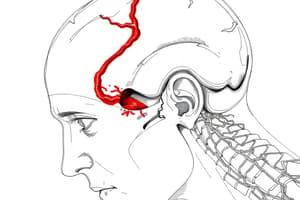Podcast
Questions and Answers
How many deaths were estimated to occur per year related to medical errors in 2015?
How many deaths were estimated to occur per year related to medical errors in 2015?
400,000
The nursing process provides the foundation for all nursing care.
The nursing process provides the foundation for all nursing care.
True (A)
What is the nursing process?
What is the nursing process?
A series of organized steps defined for nurses to provide holistic patient-focused care.
The nursing process consists of _____ steps.
The nursing process consists of _____ steps.
Which of the following are steps in the nursing process? (Select all that apply)
Which of the following are steps in the nursing process? (Select all that apply)
What is assessment in nursing?
What is assessment in nursing?
How do we collect data in nursing?
How do we collect data in nursing?
Open-ended questions allow patients to elaborate.
Open-ended questions allow patients to elaborate.
Close-ended questions allow for elaboration by the patient.
Close-ended questions allow for elaboration by the patient.
What is subjective data?
What is subjective data?
What is objective data?
What is objective data?
What is a nursing diagnosis?
What is a nursing diagnosis?
What does NANDA stand for?
What does NANDA stand for?
Describe the goals expected outcomes in nursing.
Describe the goals expected outcomes in nursing.
What is an intervention in nursing?
What is an intervention in nursing?
What is evaluation in nursing?
What is evaluation in nursing?
Why is hygiene important in nursing care?
Why is hygiene important in nursing care?
What are activities related to hygiene?
What are activities related to hygiene?
What is the maintenance of personal hygiene?
What is the maintenance of personal hygiene?
What is the nurse's role in hygiene?
What is the nurse's role in hygiene?
What factors influence hygiene and self-care?
What factors influence hygiene and self-care?
What is a factor that would most likely influence the hygiene practice of a homeless client?
What is a factor that would most likely influence the hygiene practice of a homeless client?
Flashcards are hidden until you start studying
Study Notes
Medical Errors
- Estimated 400,000 deaths annually in 2015 due to medical errors.
Nursing Process
- Serves as the foundational framework for all nursing care.
- Involves organized steps to deliver holistic, patient-focused care.
Steps of the Nursing Process
- Assessment: Gathering comprehensive information about a patient’s condition.
- Diagnosis: Identifying actual or potential health responses.
- Goals/Expected Outcomes: Establishing patient-centered, realistic, and measurable objectives.
- Interventions: Actions taken by nurses to achieve established goals, including delegation and documentation.
- Evaluation: Assessment of patient responses to nursing interventions and progress towards goals.
Assessment
- Involves collecting data on psychological, physiological, sociological, and spiritual aspects.
- Primary sources include direct patient communication; secondary sources can be family, medical records, or nurse observations.
Data Collection Techniques
- Effective communication is critical; techniques include attentive listening, clarifying responses, and making observations.
- Use of open-ended questions encourages detailed patient responses, while closed-ended questions limit answers to yes or no.
Types of Data
- Subjective Data: Information based on patient perceptions and self-reports.
- Objective Data: Observable or measurable facts, including vital signs and physical assessments.
Nursing Diagnosis
- A statement defining a patient's actual or potential health responses that a registered nurse is competent to treat.
- Utilizes the NANDA framework for standardized nursing diagnostic terminology.
Goals and Expected Outcomes
- Should be patient-centered, realistic, and measurable.
Interventions
- Defined actions by nurses to reach established goals, involve delegation, and comprehensive documentation of care provided.
Evaluation
- Continuous reassessment of nursing care plans based on patient responses and changes in condition.
Importance of Hygiene
- Essential for promoting wellness, comfort, and improving self-image while reducing infection risk.
General Hygiene Concepts
- Encompasses activities related to personal grooming, such as bathing and hair care, contributing to activities of daily living (ADLs).
Personal Hygiene Maintenance
- Benefits include enhanced self-image, comfort, and improved infection control.
Nurse's Role in Hygiene
- Assess patient self-care abilities and offer assistance with ADLs, while promoting and delegating appropriate hygiene tasks.
Influences on Hygiene Practices
- Factors affecting hygiene and self-care include personal preferences, cultural beliefs, economic status, and environmental conditions.
- Emphasis on the impact of availability of hygiene facilities, as seen with homeless clients who may lack access to basic hygiene resources.
Physical and Emotional Influences
- Cognitive impairments can hinder hygiene practices, while emotional disturbances might lead to neglecting self-care.
- Various demographic factors, including age and knowledge level, also significantly impact hygiene and self-care practices.
Studying That Suits You
Use AI to generate personalized quizzes and flashcards to suit your learning preferences.




